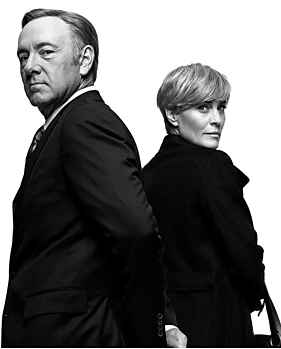Happy Valentine’s Day, Washington: Netflix has a present for you. Tonight, you and your significant other can curl up on the couch with Frank and Claire Underwood, D.C.’s favorite backstabbing power couple. House of Cards, Netflix’s ridiculous (yet hard to resist) telenovela, is back. Apparently, many Hill staffers were irate that Netflix didn’t release the show early, for binge-streaming during yesterday’s snow day.
HoC’s story, focused on a Machiavellian congressman’s rise to power, isn’t heavy on verisimiltude. Like many fictional depictions of Washington, it fails to capture “the nation’s capital as the bureaucratic and constipated place that it in fact is,” as Christopher Hitchens once put it. It takes a lot of suspension of disbelief to buy into the show’s vision of a Capitol of cunning and competent schemers.
Still, some of the characterization rings true. Two decades in, this town probably would transform Princess Bride’s pure-hearted “Buttercup” into a vicious social X‑ray running a phony environmental think tank. Likewise, my colleagues at Cato’s Center for Educational Freedom will probably appreciate the casting choice that led to former Sopranos hitman Mikey Palmice’s turn as a teacher’s union leader.
And overall, HoC is a major improvement over the last Beltway drama official Washington fell in love with: The West Wing, Aaron Sorkin’s unctuous Valentine to the Heroic Presidency. Sorkin built that show around the concept of an incorruptible president devoted to good works: the unbearably decent Josiah (Jed) Bartlet, a theologian-cum-Nobel laureate in economics, backed up by a staff of the most selfless, high-minded, public-spirited and charming political operators ever devised. It was altogether the throne-sniffingest portrayal of Washington imaginable.
I’ll take HoC’s Beltway Borgias over Sorkin’s Cartoon Camelot any day. As I wrote in the Washington Examiner this week: “At least ‘House of Cards’ is willing to entertain the idea that political animals aren’t angels and that ‘public service’ often deserves the scare quotes.”
In a recent profile of showrunner Beau Willimon, the New York Times Magazine noted that the Netflix series “stands out for its unblinking commitment to a singularly dark vision of politics.” It’s “a cold dissection of the post-Obama (or post-the-Obama-many-hoped-they’d‑elected), post-hope political landscape.” Much too cold for those who still believe in a place called Hope. Last month, AV Club’s Jason Lynch waxed rhapsodic over West Wing’s “preposterous” but inspiring vision of a incorruptible president, and lamented that “a noble image of the presidency, and of politicians, that is absent from TV today.” Where have you gone, Jed Bartlet? A nation turns its lonely eyes to you.
Alas, Lynch writes:
Seven years after The West Wing ended its run, audiences now gravitate toward political shows like House Of Cards, Scandal, Veep, and the new Alpha House, … [that] revolve around presidents and other leaders who are either despicable, incompetent, or both. In other words, they’re just as selfish, sleazy, and/or stupid as we perceive many contemporary leaders to be.
President Obama has been waging a “War on Cynicism” since his first Inaugural Address, deriding “cynics” who “question the scale of our [that is, the federal government’s] ambitions.” And cynicism’s winning. This is progress!
Political “cynicism”—or, less tendentiously, skepticism toward power—is the health of a limited state. It makes ambitious federal programs much less likely to pass, decreases support for foreign-policy adventurism, and makes the public less likely to endorse restrictions on civil liberties. When we trust too much is when we get into trouble.
You wouldn’t think official Washington would be so enthusiastic about a drama that depicts D.C.‘s power brokers as utterly untrustworthy, irredeemably venal, and possibly murderous. But boy, are they ever: here’s the 2013 House of Cards spoof from the White House Correspondents dinner, featuring Kevin Spacey, with John McCain, Jay Carney, Valerie Jarrett, and others elbowing each other out of the way to mug for the camera. Here’s another with various congresscritters—including the current and former House Majority Whips—reading Frank Underwood lines from the show. Hollywood for the Pathetic: as Spacey says, “it’s hard to write jokes for a town that already is one.”
Maybe Beltway pols like the show because it’s a power fantasy that appeals to their bottomless self-regard: “Sure, it paints us as evil, but it also makes us look like we know what we’re doing!” If HoC’s cynicism wounds, its vision of competence flatters.
Heck, even Obama likes the show: “I wish things were that ruthlessly efficient,” he’s said: “It’s like Kevin Spacey, man, this guy’s getting a lot of stuff done.” I see what he means, though I’d feel more comfortable if he hadn’t added that last bit.

